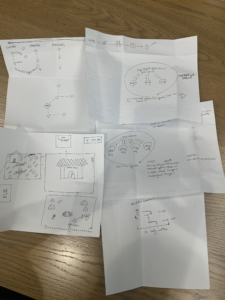I’m part of the Stanford Vietnamese Students’ Association, and recently we had our annual end-of-year banquet. As per tradition, everyone is given a group-determined superlative at the end of the banquet; my superlative was “Best Game Developer.” Disregarding the fact that I think I’m the only game developer in the club, this anecdote might suffice to demonstrate just how much game development has been “my thing” during my time at Stanford. It’s the cornerstone I’ve used to claim a unique identity amidst a sea of high-achievers, and the one pursuit I’ve tried to craft a future around. Game development is my passion, for the time being. So for me, the opportunity to take CS 247G and unite my identities as a Stanford CS student and game developer was a dream come true.

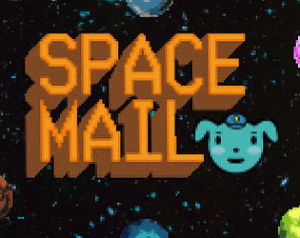
The two projects I worked on in this class, Scooped! (P1) and SpaceMail (P2)
My goal for the class were twofold. First, I wanted to study game design, a hobby I’ve pursued independently for years, formally, and hopefully learn some new mental models of game design that would help bolster my independent projects. Second, I wanted to explore working on a game in a team, and decide what I liked or ddn’t like about it. (I have, as of yet, never found it worthwhile to pursue a partnership in my independent projects, and I was hoping to change my mind.) So, how successful was I at these goals?
I’ve learned how to work on a game with a team—and found out what I like and don’t like about it.
I was constantly humbled by the innovation, brilliance, and unique perspectives of my team. I’ve learned that I rarely, if ever, have things right by myself, and my teammates were there to correct me an refreshing amount of times. For example, I wanted to implement a complex end-of-day mechanic in our second project, SpaceMail, for a list of convoluted justifications loosely based in game design and user experience. Michelle suggested, “Why not just use a button?” And in the final game, a button was the solution we ultimately decided on. There are a hundred other examples like this.

Sometimes, the solution is so obvious. You just need someone to point it out to you.
On the other hand, I think it takes a fair amount of skill to pilot a team correctly to a good finished product, and I’ve found I need to develop this skill further before I’m ready to pursue working with collaborators on my own projects. For example, I had a relatively high level of experience on the development side of things, and this made collaborating on the code a little awkward in the early stages of the project. I experienced firsthand the overhead that comes with trying to align on project vision with a team, especially with five people, and at times I struggled to accept the labor spent on team alignment. As a game developer, I think I’m taking forward that the benefits of teamwork are worthwhile if the project has a strong identity that isn’t watered down by groupthink and partners are aligned on the project’s vision (which is easier with fewer people). If these challenges can be overcome, teamwork can be transformative for a project.
I’ve learned to appreciate the power of sketching as a design tool.
Sketching is great. At one time, I attempted to write a maintain a design document for my current project, Apothecary, but I was never able to stay consistent with it. The text format was just too incompatible with the design process, so I largely abandoned planning and documentation.
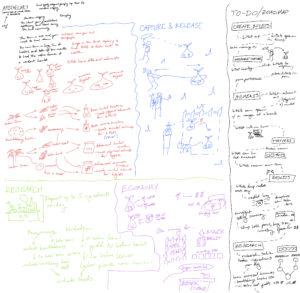
I started sketching as a way to understand Apothecary. This was a sketch from when I revamped my farming game loop.
This class has helped me realize that sketching might be what I’ve been looking for when it comes to having a way to put my ideas down onto paper. The process of being forced to conceptualize and record a design idea has been transformative for my design process. Since, I’ve been filling sheets of printer paper with different design ideas to help me understand my game better.
The random Apothecary sketches I found stuffed in my backpack. There are even more back in my dorm room.
After Stone Librande’s talk about “one-page designs” I attempted to sketch my own one-page design for my game and another game it’s taken a lot of inspiration from: Stardew Valley. I wanted to get a sense of what to take from Stardew Valley and what I wanted to toss out or change. What came out of it was a new understanding of what makes the farming simulator genre fun, and it changed how I saw the goals of my game.
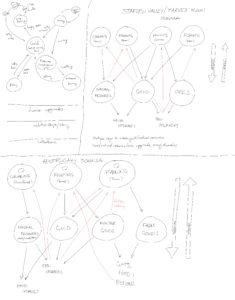
This is really three one-page documents in one. My game as it currently stands (top-left), my exploration of Stardew Valley (top-right), and the new ideal model of my game (bottom).
On the whole, I will definitely be taking sketching forward as a new tool in my game design kit.
I’ve learned the value of trying lots of games, and how to play games as a designer.
Finally, I’m taking away from this class a realization that to be a good game designer, you have to play a lot of games. Prior to this class, I actually didn’t care much for playing other indie developers’ games. I didn’t see the payoff and thought that time would be spent better on just working on my game.
The critical plays in this class have given me a chance to play a plethora of games I’ve always “wanted to try” (but really never intended to unless I was forced). HerStory, Firewatch, Archvale, Fez, and Unpacking were just a few. And playing these games has taught me a lot of neat tidbits about various aspects of game design (Archvale, for example, does juice and “game feel” really well, and I’ve tried to replicate various aspects of it in Apothecary).
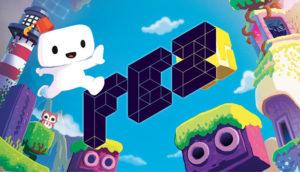
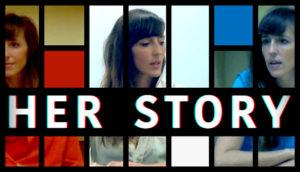
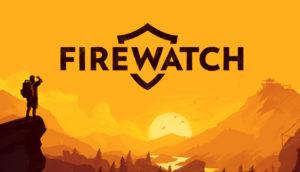
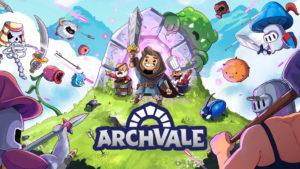
More importantly, though, playing these games always reinvigorates my passion for game design. The indie dev dream feels so far away sometimes, and my project is slowly exiting the honeymoon phase and entering the realm of “long, indefinite grind.” Playing these games, labors of love made by small teams just passionate about sharing their experience with the world, reminds me why I do this to begin with. When I feel a jolt of surprise at an innovative mechanic, somber empathy during a character’s cutscene, or even just a wave of relief to be able to escape into another world for a little bit, I am reminded why games are important: because humans make art, and humans need art. I’m going to make art.


